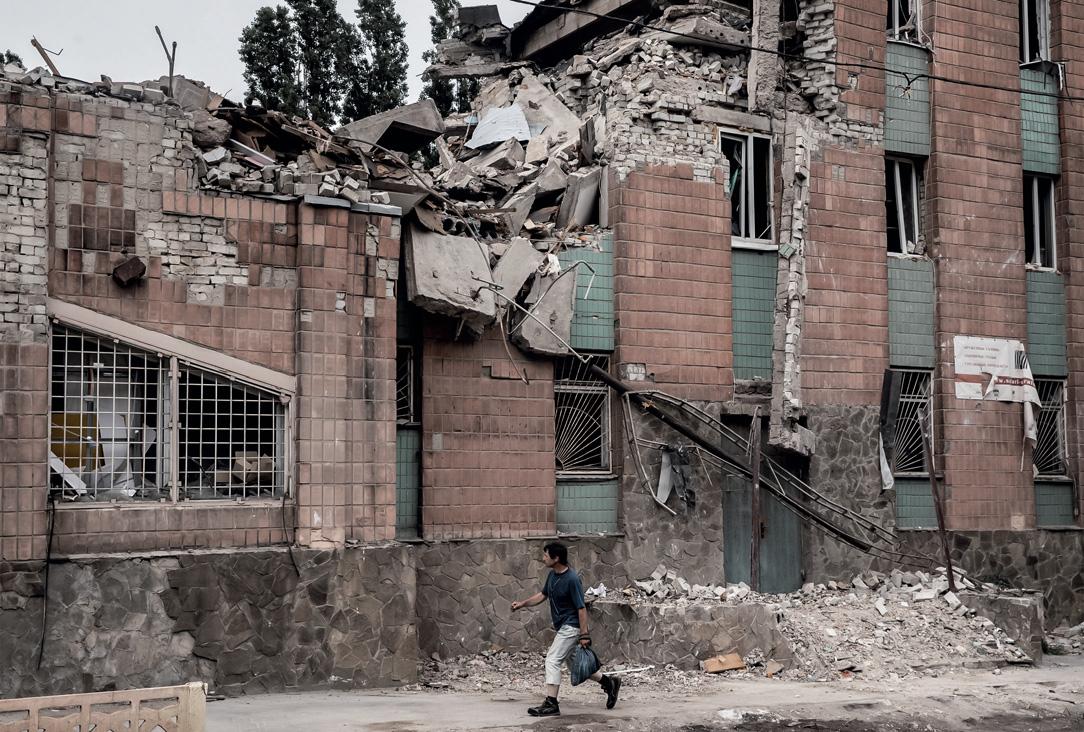
The flat's inhabitants - Svitlana Vlasenko and her grownup daughter, Polina - were not coming back. The Russian missile that fell on their building on a Friday night killed them and six of their neighbours. Twenty-six people were injured, two of them children.
The street in Ukraine's second city, Kharkiv, was not near any military objects. It was a quiet place of flowerbeds, communal benches and a sandy play area for children. Residents walked their dogs in a resin-scented pine forest, which was also hit in the strike on 31 May by five S-300 rockets.
Since Vladimir Putin's full-scale invasion of Ukraine, Kharkiv has been under constant bombardment. Russian troops tried and failed to occupy the city. They retreated but were close enough to pound it with artillery. In September 2022, Ukrainian forces pushed the Russians back to the state border. On 10 May this year, the Kremlin staged a fresh incursion, seizing the town of Vovchansk and assaulting the hilltop village of Lyptsi.
At the same time, Moscow intensified its aerial attacks on Kharkiv, using drones and surface-to-air missiles. Taking the city remains a Russian objective. For now, Putin appears determined to break the resistance of its 1 million inhabitants by subjecting them to deadly and terrifying strikes. "They want to make Kharkiv a grey zone so we can't work or live or have fun," said Liliia Yakovleva, 27, an accountant.
Yakovleva lives across the square from where the attack took place. She said the first missile blew out her neighbour's windows. The second, a few minutes later, plunged into number 24, a five-storey private block. "The explosion threw bodies on the ground. I saw one was on fire," she said.
"For two years you think the war is near but it won't take you. You live your life. Then you understand the war can come for you at any time."
This story is from the June 21, 2024 edition of The Guardian Weekly.
Start your 7-day Magzter GOLD free trial to access thousands of curated premium stories, and 9,000+ magazines and newspapers.
Already a subscriber ? Sign In
This story is from the June 21, 2024 edition of The Guardian Weekly.
Start your 7-day Magzter GOLD free trial to access thousands of curated premium stories, and 9,000+ magazines and newspapers.
Already a subscriber? Sign In

The Saudi football World Cup is an act of violence and disdain
Well, that's that then. In the event there were only two notes of jeopardy around Fifa's extraordinary virtual congress last week to announce the winning mono-bids, the vote without a vote, for the right to host the 2030 and 2034 football World Cups.

AI has made the move into video and it's worryingly plausible
I recently had the opportunity to see a demo of Sora, OpenAI's video generation tool, which was released in the US last Monday, and it was so impressive it made me worried for the future.

With tyrant Assad ousted, Syrians deserve support and hope
Last week, time collapsed. Bashar al-Assad's fall recalled scenes across the region from the start of the Arab spring almost 14 years ago. Suddenly history felt vivid, its memories sharpened. In fact it no longer felt like history.

TV
The Guardian Weekly team reveals our small-screen picks of the year, from the underground vaults of post-apocalyptic Fallout to the mile-high escapism of Rivals

Albums
Murky love stories, nostalgic pop and an in-your-face masterpiece captured our critics' ears in 2024

Film
Visual language, sound, light and rhythm are to the fore in the best movies of the year

Hidden delights Our 24 travel finds of 2024
Guardian travel writers share their discoveries of the year, from Læsø to Lazio

'It's really a disaster' The fight to save lives as gang war consumes capital
Dr James Gana stepped out on to the balcony of his hospital overlooking a city under siege. \"There's a sensation of 'What's next?'. Desperation is definitely present,\" the Médecins Sans Frontières (MSF) medic said, as he stared down at one of scores of camps for displaced Haitians in their country's violence-plagued capital.

Trailblazers The inspiring people we met around the world this year
From an exuberant mountaineer to a woman defiantly facing the guns of war, here are some of the brave individuals who gave us hope in a tumultuous 2024

Votes of confidence
From India to Venezuela and Senegal to the US, more people voted this year than ever before, with over 80 elections across the world. With rising authoritarianism and citizen-led resistance revealing its vulnerabilities and resilience in the face of unprecedented challenges, has democracy reached its breaking or turning point?